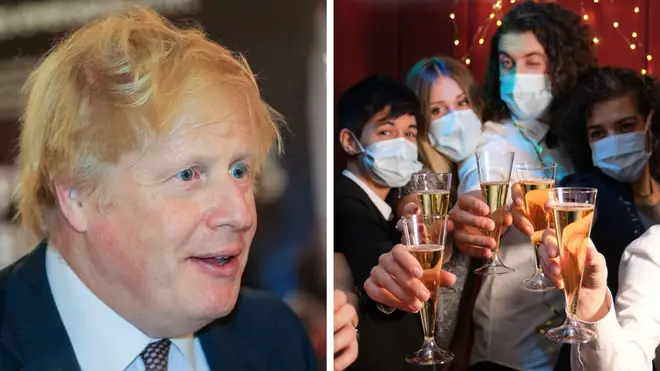
Clive Bull 1am - 4am
1 December 2021, 02:50 | Updated: 7 June 2023, 08:56

Boris Johnson has given Christmas parties and nativity plays the green light as part of a "balanced and proportionate" approach to the pandemic.
He instead promised to "throw everything" at the booster vaccine roll out in an effort to tackle the spread of the latest Omicron Covid variant.
Speaking at a Downing Street press conference, Mr Johnson said: "We don't want people to cancel such events and we think that, overwhelmingly, the best thing for kids is to be at school, as I have said many times throughout this pandemic.
"What we are doing is trying to take a balanced and proportionate approach to the particular risk that seems to be posed by Omicron - certainly is posed by Omicron - focused, in particular, on measures at the border.
"And we think that’s the right way to go for the time being, until we know more and until we can get more boosters, as we’ve been saying, into people’s arms."
Mr Johnson announced that all adults would be offered their boosters by the end of January, in the ongoing race against the Omicron variant.
He also confirmed that the military would be brought in, helping health staff deliver jabs as part of the effort.
Read more: Omicron: All adults to be offered Covid booster jab by end of January, PM confirms
Read more: We won't impose Plan B despite Jenny Harries' gloomy Omicron comments, Boris says

Boris Johnson urges Brits to get boosted to fight Omicron
His comments came despite senior medic Dr Jenny Harries' earlier suggestion that people limit socialising over the festive period to prevent the new variant spreading.
She said people should decrease "social contacts" and avoid mixing "when we don't particularly need to".
In response, Mr Johnson initially said "it's always sensible to be careful" but refused to change advice.
It follows the Government's decision to implement face masks indoors and bring back certain travel restrictions.
Omicron has caused increased concern since it was first identified in the UK, with the World Health Organisation (WHO) saying there was an "increased risk of reinfection" due to several mutations of the variant.
So far, 22 cases have been identified - 13 in England and nine in Scotland.